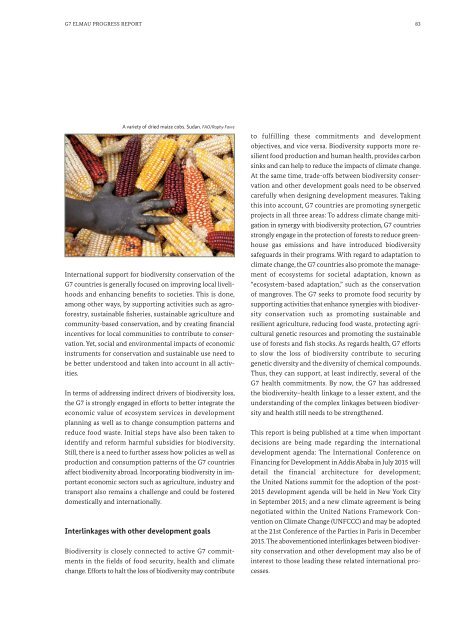G7-Elmau-Progress-Report-2015-Biodiversity-A-vital-foundation-for-sustainable-development
G7-Elmau-Progress-Report-2015-Biodiversity-A-vital-foundation-for-sustainable-development
G7-Elmau-Progress-Report-2015-Biodiversity-A-vital-foundation-for-sustainable-development
You also want an ePaper? Increase the reach of your titles
YUMPU automatically turns print PDFs into web optimized ePapers that Google loves.
<strong>G7</strong> ELMAU PROGRESS REPORT 83A variety of dried maize cobs. Sudan. FAO/Raphy FavreInternational support <strong>for</strong> biodiversity conservation of the<strong>G7</strong> countries is generally focused on improving local livelihoodsand enhancing benefits to societies. This is done,among other ways, by supporting activities such as agro<strong>for</strong>estry,<strong>sustainable</strong> fisheries, <strong>sustainable</strong> agriculture andcommunity-based conservation, and by creating financialincentives <strong>for</strong> local communities to contribute to conservation.Yet, social and environmental impacts of economicinstruments <strong>for</strong> conservation and <strong>sustainable</strong> use need tobe better understood and taken into account in all activities.In terms of addressing indirect drivers of biodiversity loss,the <strong>G7</strong> is strongly engaged in ef<strong>for</strong>ts to better integrate theeconomic value of ecosystem services in <strong>development</strong>planning as well as to change consumption patterns andreduce food waste. Initial steps have also been taken toidentify and re<strong>for</strong>m harmful subsidies <strong>for</strong> biodiversity.Still, there is a need to further assess how policies as well asproduction and consumption patterns of the <strong>G7</strong> countriesaffect biodiversity abroad. Incorporating biodiversity in importanteconomic sectors such as agriculture, industry andtransport also remains a challenge and could be fostereddomestically and internationally.Interlinkages with other <strong>development</strong> goals<strong>Biodiversity</strong> is closely connected to active <strong>G7</strong> commitmentsin the fields of food security, health and climatechange. Ef<strong>for</strong>ts to halt the loss of biodiversity may contributeto fulfilling these commitments and <strong>development</strong>objectives, and vice versa. <strong>Biodiversity</strong> supports more resilientfood production and human health, provides carbonsinks and can help to reduce the impacts of climate change.At the same time, trade-offs between biodiversity conservationand other <strong>development</strong> goals need to be observedcarefully when designing <strong>development</strong> measures. Takingthis into account, <strong>G7</strong> countries are promoting synergeticprojects in all three areas: To address climate change mitigationin synergy with biodiversity protection, <strong>G7</strong> countriesstrongly engage in the protection of <strong>for</strong>ests to reduce greenhousegas emissions and have introduced biodiversitysafeguards in their programs. With regard to adaptation toclimate change, the <strong>G7</strong> countries also promote the managementof ecosystems <strong>for</strong> societal adaptation, known as“ecosystem-based adaptation,” such as the conservationof mangroves. The <strong>G7</strong> seeks to promote food security bysupporting activities that enhance synergies with biodiversityconservation such as promoting <strong>sustainable</strong> andresilient agriculture, reducing food waste, protecting agriculturalgenetic resources and promoting the <strong>sustainable</strong>use of <strong>for</strong>ests and fish stocks. As regards health, <strong>G7</strong> ef<strong>for</strong>tsto slow the loss of biodiversity contribute to securinggenetic diversity and the diversity of chemical compounds.Thus, they can support, at least indirectly, several of the<strong>G7</strong> health commitments. By now, the <strong>G7</strong> has addressedthe biodiversity–health linkage to a lesser extent, and theunderstanding of the complex linkages between biodiversityand health still needs to be strengthened.This report is being published at a time when importantdecisions are being made regarding the international<strong>development</strong> agenda: The International Conference onFinancing <strong>for</strong> Development in Addis Ababa in July <strong>2015</strong> willdetail the financial architecture <strong>for</strong> <strong>development</strong>;the United Nations summit <strong>for</strong> the adoption of the post-<strong>2015</strong> <strong>development</strong> agenda will be held in New York Cityin September <strong>2015</strong>; and a new climate agreement is beingnegotiated within the United Nations Framework Conventionon Climate Change (UNFCCC) and may be adoptedat the 21st Conference of the Parties in Paris in December<strong>2015</strong>. The abovementioned interlinkages between biodiversityconservation and other <strong>development</strong> may also be ofinterest to those leading these related international processes.


